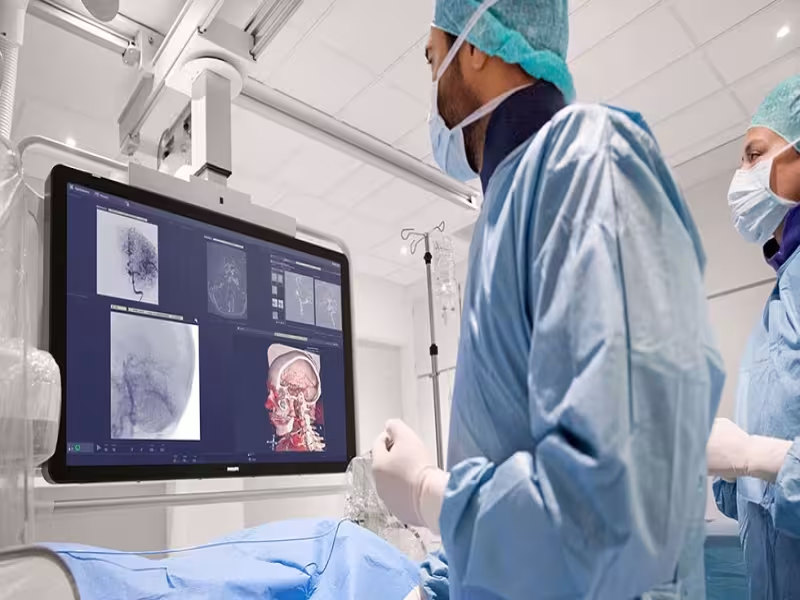
SHERIDAN, WYOMING – August 27, 2025 – Royal Philips reported strong second-quarter results, marked by accelerating order intake, margin expansion, and a series of AI-powered product launches that reinforce its position in diagnostic imaging, interventional care, and patient monitoring. The company increased its full-year outlook for adjusted EBITA margin and free cash flow, citing disciplined productivity programs and strong demand for advanced technologies.
Momentum in Orders and Financial Performance
Philips recorded a 6% increase in comparable order intake, supported by innovation-driven demand, following 9% growth in Q2 2024. Group sales reached €4.3 billion, a 1% year-on-year increase. Adjusted EBITA margin rose 130 basis points to 12.4%, aided by favorable product mix, productivity gains, and AI-led innovations that offset tariff and currency pressures. Free cash flow climbed to €230 million, strengthening the company’s liquidity position.
Strategic Partnerships Expand Access to Care
A central highlight was a long-term agreement with the Indonesian Ministry of Health to deploy Philips’ Azurion image-guided therapy platform across all 38 provinces. This initiative aims to expand nationwide access to advanced cardiac, stroke, and cancer care for a population of more than 280 million. The scale of the rollout underscores the role of global partnerships in driving equitable access to precision medicine in emerging markets.
AI-Powered Innovation Gains Regulatory and Market Traction
Philips’ innovation engine continues to deliver market differentiation:
- SmartSpeed Precise MR, the first integrated dual AI MRI software, received FDA 510(k) clearance, offering up to three times faster scans and 80% sharper images with a single click.
- Spectral CT 7500 and CT 5300 systems were delivered to University Health San Antonio, delivering AI-enabled, low-dose imaging to support faster clinical workflows.
- The Flash Ultrasound System 5100 POC was introduced to address urgent diagnostic needs in point-of-care environments.
- Philips initiated the RADIQAL clinical trial to evaluate its SmartIQ ultra-low-dose technology in coronary procedures.
These launches highlight Philips’ focus on AI-driven imaging platforms that improve speed, image quality, and clinician workflow—addressing ongoing pressures for efficiency in hospital radiology departments.
Global Monitoring and Connected Care Partnerships
In the U.S. and Europe, Philips secured long-term monitoring partnerships with health systems including the Rush University System for Health. Through its Patient Information Center iX (PIC iX) and IntelliVue monitors, the company is enabling real-time, AI-supported monitoring at scale. These solutions are increasingly relevant as providers seek to centralize data for acute care management and reduce clinician burden in resource-constrained environments.
CEO Perspective on Execution and Outlook
Roy Jakobs, CEO of Royal Philips, emphasized the importance of execution discipline and innovation-led growth, stating:
“We are focused on driving profitable growth and delivering better care for more people. We built order intake growth momentum, supported by our recently launched AI-powered innovations. Our multi-year agreement with the Indonesian Ministry of Health reinforces the impact for patients of our industry-leading innovations as we provide nationwide coverage for image-guided therapy, expanding access to cardiac, stroke and cancer care for millions.”
Strategic Implications for Providers
For hospitals and health systems, Philips’ performance illustrates a pivot toward integrated, AI-enabled platforms that reduce scan times, optimize imaging quality, and expand patient monitoring beyond traditional care settings. In a landscape shaped by tariff volatility and cost pressures, Philips’ ability to deliver measurable productivity savings (€197 million in Q2 alone) aligns with provider priorities of operational resilience and cost efficiency.
Outlook and Market Positioning
Philips reiterated its 2025 comparable sales growth outlook of 1%–3% while raising its EBITA margin guidance to 11.3%–11.8%. Free cash flow is expected between €0.2–0.4 billion for the year. With a €2.5 billion, three-year productivity program on track, the company is positioning itself as a leading partner for health systems navigating the dual challenge of rising demand and cost containment.
Learn more at Philips Healthcare.